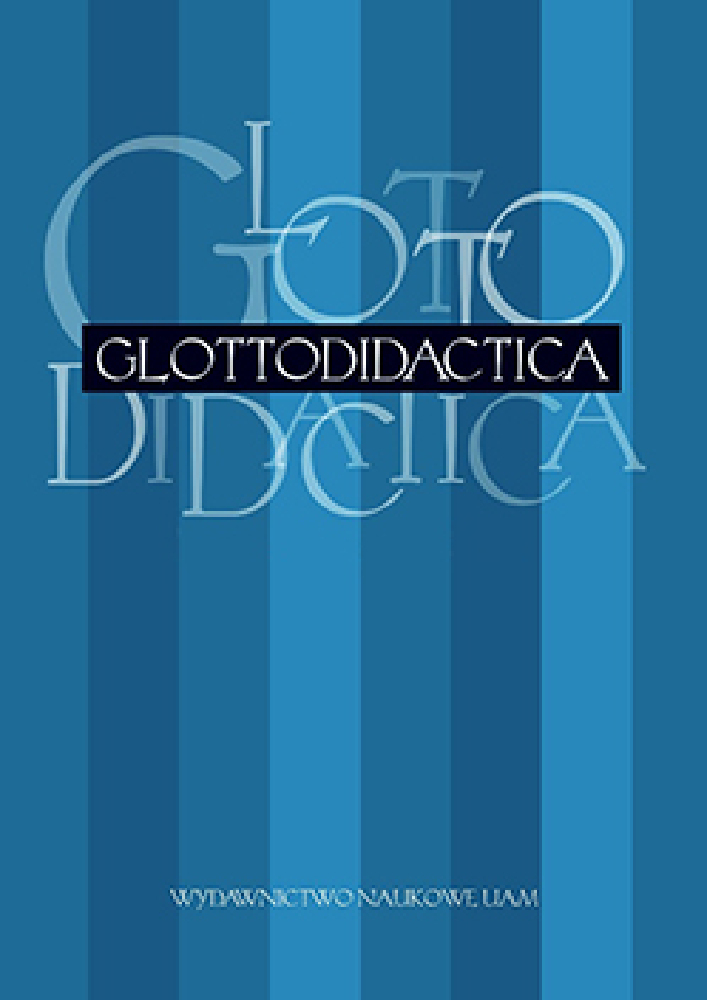Abstract
Religion as a part of culture has similarities to language: it is characteristic for nearly every individual. As there are processes of interculturality (contact of different cultures) there are also processes of inter-religiosity. On the examples of John Paul II. and Benedict XVI. the author explains the development and the theological background of the growing dialogue between religions. Although the differences are often a base for conflicts, there are many (worldwide) interreligious movements that are exemplary and therefore worth discussing.Literaturhinweise
Alba, J. / Chorin, J., 2010. Halleluja! Ein Papst-Krimi. Reinbek bei Hamburg: Rowohlt Verlag.
Benedikt XVI., 2010. Licht der Welt. Der Papst, die Kirche und die Zeichen der Zeit. Ein Gespräch mit P. Seewald. Freiburg u.a.: Herder-Verlag.
Collins, F.S., 2008. Język Boga. Kod życia – nauka potwierdza wiarę (Orig.: The Language of God). Warszawa: Świat Książki.
Griffiths, B., 1993. Chrześcijański Aśram (Christian Ashram). Kraków: Wydawnictwo Znak.
Grucza, F. 1992, Kulturowe determinanty języka oraz komunikacji językowej. In: Grucza, F. (Hrsg.), Język, kultura – kompetencja kulturowa. Warszawa: WUW, 9–70.
Grucza, S., 2010. Główne tezy antropocentrycznej teorii języków. In: Lingwistyka Stosowana 2, 41–68.
Heisig, J.W., 1996. Interreligiosity and Conversion. Nanzan Bulletin 20. Ed.: Nanzan Institute for Religion and Culture, Nanzan University, Nagoya, Japan.
Henrix, H.H., 2006. Einfluss und Wirkungen der Konzilserklärung Nostra Aetate, Artikel 4 in Europa. In: Ders.: Nostra Aetate – Ein zukunftsweisender Konzilstext. Die Haltung der Kirche zum Judentum 40 Jahre danach., Aachen: Einhard-Verlag, 59–82.
Hess-Lüttich, E.W.B. / Natarajan, A. (Hrsg.), 2009. Der Gott der anderen. Interkulturelle Transformationen religiöser Traditionen. Frankfurt am Main: Peter Lang Verlag.
Hołownia Sz., 2009. Monopol na zbawienie. Kraków: Wydawnictwo Znak.
Jaszewska, M., 2009. Die christlichen Minderheiten in Polen. Gespräch (übers. v. U. Bischof). In: Kaluza, A. / Wierczimok, J.: Jahrbuch Polen 2009: Religion (Band 20). Deutsches Polen-Institut Darmstadt: Harrassowitz Verlag, 78–91.
Kapellari, E., 1995. Und haben fast die Sprache verloren. Fragen zwischen Kirche und Kunst. Graz, Wien, Köln: Verlag Styria.
Möller, Ch., 2005. Kirche, die bei Trost ist. Plädoyer für eine seelsorgliche Kirche. Göttingen: Vandenhoeck & Ruprecht.
Neuhold, L., 1988. Wertwandel und Christentum. Reihe Soziale Perspektiven, B. 4. Linz: Veritas Verlag.
Nosowski, Z. / Lipscher W., 2009. Der Papst ein Pole, Der Papst – ein Deutscher. Gespräch. In: Kaluza, A. / Wierczimok, J.: Jahrbuch Polen 2009: Religion (Bd 20). Deutsches Polen-Institut Darmstadt: Harrassowitz Verlag, 122–127.
Papież Jan Paweł II, 1997. Orędzie życia. Przesłanie Ojca Świętego do członków Papieskiej Akademii Nauk, In: W drodze 9, 44–45.
Ratzinger, J. 2010, Kirche – Zeichen unter den Völkern. Schriften zur Ekklesiologie und Ökumene. Erster Teilband. Freiburg u.a.: Herder.
Schweitzer, A., 1993. Wielcy myśliciele Indii (Orig.: Les grands penseurs de l‘Inde). Warszawa: Wydawnictwo Cyklady.
Siegert, B., 2003. Das Fremde – ein Phänomen zwischen Angst und Faszination. Ein Unterrichtsentwurf für den evangelischen Religionsunterricht einer vierten Klasse in einer Grundschule. In: Siedler, D. Chr.: Unterrichtsentwürfe zum Interreligiösen Lernen: „Das Fremde“, Umgang mit dem Fremden, Der Islam hat viele Gesichter. Internet-Publikation, www.uni-duisburg.de/FB1/THEO/Praxishilfen%2020030 630.PDF (letzte Eins.: 10.11.2010).
Smith, H., 1994. Religie świata (Orig.: The World’s Religions), Warszawa: Wydawnictwo Alfa-Wero.
Utri, R., 2010. Charakteristik der Fachsprache Christliche Theologie. In: Komunikacja Specjalistyczna (Fachsprachenkommunikation), Bd 4, in Druck.
Utri, R., 2011. Vom Interkulturellen zum Interreligiösen Lernen – eine Begriffsklärung auf der Basis der anthropozentrischen Sprachentheorie. In: Germanica Wratislaviensia, Heft 134, in Druck.
Zubczyńska, U. 2011. Papież przebacza. In: Przyjaciółka, wydanie specjalne: Droga do świętości, 12–13.
Lizenz
Authors
Authors of texts accepted for publication in Glottodidactica are required to complete, sign and return to the editor's office the Agreement for granting a royalty-free license to works with a commitment to grant a CC sub-license.
Under the agreement, the authors of texts published in Glottodidactica grant the Adam Mickiewicz University in Poznań a non-exclusive, royalty-free license and authorize the use of Attribution-NoDerivatives 4.0 International (CC BY-ND 4.0) Creative Commons sub-license.
The authors retain the right to continue the free disposal of the work.
Users
Interested Internet users are entitled to use works published in Glottodidactica since 2016, under the following conditions:
- attribution - obligation to provide, together with the distributed work, information about the authorship, title, source (link to the original work, DOI) and the license itself.
- no derivatives - the work must be preserved in its original form, without the author's consent it is not possible to distribute the modified work, such as translations, publications, etc.
Copyrights are reserved for all texts published before 2016.
Miscellaneous
Adam Mickiewicz University in Poznań retains the right to magazines as a whole (layout, graphic form, title, cover design, logo etc.).




